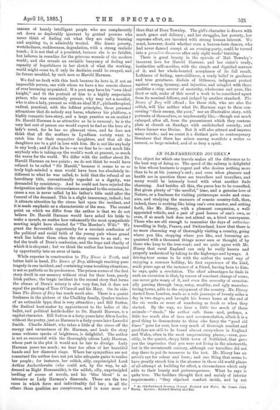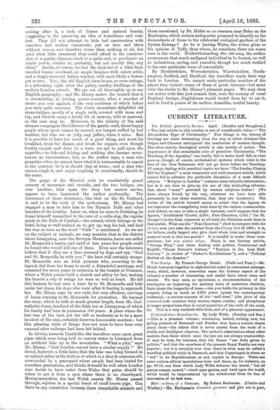AN OLD-FASHIONED JOURNEY.*
THE object for which one travels makes all the difference as to the best way of doing so. The speed of the railway is delightful to him whose business is urgent and who desires nothing more than to be at his journey's end ; and even when pleasure and health are in question there are travellers and travellers, and many would be intensely bored with what another finds charming. And besides all this, the purse has to be consulted. But given plenty of " the needful," time, and a genuine love of Nature, or a fondness for visiting picturesque nooks and crannies, and studying the manners of remote country-folk, then, indeed, there is nothing like being one's own master, and setting forth, like Mr. Hissey, with a pleasant companion, a wellappointed vehicle, and a pair of good horses of one's own, or even, if so much luck does not attend us, a hired conveyance. Those who are old enough to remember the days of vetturinotravelling in Italy, France, and Switzerland, know that there is no more charming way of thoroughly visiting a country, going where you like, stopping where you like, and becoming acquainted with a thousand things never seen or thought of by those who keep to the iron-road; and we quite agree with Mr. Hissey that rural England can only be really known and properly understood by taking to the highways and byways. A driving-tour seems to be with the author the usual way of enjoying a summer holiday, his first experience of the kind, made years ago at the instance of a friend, having been to him, he says, quite a revelation. The chief advantages ho finds in such an excursion is that, by reason of constant change of scene, one never gets weary of it, and even the necessity of occasionally passing through busy, noisy, wealthy, and ugly manufac
turing towns, adds to the enjoyment of the country. Mr. Hissey started from London, made as a rule journeys of twenty miles a day in two stages, and brought his horses home at the end of the six weeks or more of wandering as fresh as when they started. By the way, we hear a little too much of these animals—" steeds," the author calls them—and, perhaps, a little too much also of inns and accommodation, albeit it is a good thing to demonstrate to those who fancy the "good old times" gone for ever, how very much of thorough comfort and good-fare are still to be found almost everywhere in England and Wales, often in the most umpromising places,—even, possibly, in the quaint, sleepy little town of Nettlebed, that gave you the impression that you were not living in the nineteenth, but in the seventeenth century, although our travellers did not stop there to put its resources to the test. Mr. Hissey has an artist's eye for colour and form ; and one thing that seems to have greatly struck him is the absence in these old-world places of all attempt at building for effect, a circumstance which only adds to their beauty and picturesqueness. What he says is quite true. The builders thought first and mainly of interior requirements ; "they ohtained comfort inside, and by not seeking after it, a look of fitness and natural beauty, suggesting to the passer-by an idea of homeliness and comfort. They did not attempt to hide bad construction with senseless and useless ornaments, put on here and there without reason, and therefore worse than nothing at all, but used what little ornament they could afford in the construction of a quaint chimney-stack or a gable-end, or perchance an ample porch, similar to, probably, but not exactly like, any other." Inside, of course, we find the dark-red of a tiled floor, unceiled beams overhead, an ample fireplace with oaken settle, and a deeply-recessed lattice window, with most likely a flowerpot or two. Yes ; the old English farm-house, or even cottage, is a refreshing sight after the paltry, tawdry dwellings of the modern London suburb. We are not all thoroughly tip in our English geography ; and Mr. Hissey makes the remark that it is astonishing, in driving across-country, what a number of rivers you run against, of the very existence of which before you were quite unaware. The rivers necessitate delightful old stone-bridges, mostly of a single arch, covered with moss and ivy, and furnish many a lovely bit of scenery, wild or pastoral, as the case may be. Moreover, in the vicinity of the said streams congregate the followers of the gentle craft, those happy people whose sport cannot be marred nor temper ruffled by bad weather, but who are as jolly, nay jollier, when it rains. But it is possible to have too much of a good thing, and trout for breakfast, trout for dinner, and trout for supper, even though freshly caught and done to a turn, are apt to pall upon the appetite,—as fish and fishing, and nothing else, become monotonous as conversation ; but, as the author says, a man who grumbles when he cannot have what it is unreasonable to expect in the quarters he is in should stay at home ; and a man who cannot rough it, and enjoy roughing it occasionally, should do the same.
The gorge of the Rheidol, with its wonderfully grand scenery of mountain and cascade, and the two bridges, one over another, that span the deep but narrow ravine, appear to have impressed the author profoundly. The lowermost of these structures, like that on the St. Gothard, is said to be the work of the arch-enemy. Mr. Hissey had engaged a man to take him to the Mynach Falls and other beauties of the locality. Later on, when he came to Festiniog, he found himself committed to the care of a collie-dog, the regular guide to the Falls of Cynfael,—the animal, which belongs to the hotel, being so well trained as to get up, wag his tail, and lead the way as soon as the word "Falls " is mentioned. As we are on the subject of animals, we may mention that in the district about Llangynog, near the Berwym Mountains, hares are called St. Monacella's lambs, and until of late years few people could be found who would kill one of them. Even now the labourers believe that if they see a hare pursued by dogs and say, " God and St. Monacella be with you !" the hare will certainly escape. St. Monacella was an Irish princess who, according to the legend, fled from her home to avoid a distasteful marriage, and remained for seven years in seclusion in the hamlet of Pennant, where a Welsh prince built a church and abbey for her, making the hamlet a city of refuge for man as well as beast. He did this because he had seen a hare fly to St. Monacella and hide under her dress, the dogs who were after it fearing to approach her. Mr. Hissey says he saw rude, but very effective, carvings of hares running to St. Monacella for protection. He learned the story, which he tells at much greater length, from Mr. Cadwallader Jones, landlord of the little inn at Llangynog, of which his family had been in possession 500 years. A place where the fare was of the best, yet the bill so moderate as to be a mere incident of the stay, certainly deserves honourable mention ; but this pleasing state of things does not seem to have been very unusual after railways had been left behind.
In driving towards Llanfyllin, the travellers came upon great pipes which were being laid to convey water to Liverpool from an artificial lake up in the mountains. " What a-pity," says Mr. Hissey, " that London cannot have a similar supply !" He found, however, a little later, that the lake was being formed in an upland valley at the bottom of which is a church centuries old, surrounded by a graveyard where people had been buried for countless generations, and thinks it would be well when London does decide to have water from Wales that pains should be taken to get it from a spot where there is no churchyard. Montgomeryshire, the last Welsh county Mr. Hissey passed through, rejoices in a special breed of snuff-brown pigs. Can there be any connection between these remarkable animals and those mentioned by Dr. Helfer as so common near Beles on the Euphrates, which certain antiquaries proposed to identify as the descendants of those in the celebrated zoological gardens of the Syrian Satraps P As he is leaving Wales, the writer gives us his opinion of Taffy, than whom, he considers, there are worse men in the world. Nothwithstanding the old song, the author pronounces that much-maligned individual to be honest, as well as industrious, saving, and peaceful, though too much wedded to his own particular form of conventicle.
By Herefordshire, Worcestershire, Warwickshire, Northampton, Bedford, and Hertford, the travellers made their way back to London. We cannot make particular mention of the places they visited—some of them of great interest—but must refer the reader to Mr. Hissey's pleasant pages. We may close our notice with this just remark that, were the scenery of rural England foreign, Englishmen would travel from far to see it, and be loud in praise of its mellow, homelike, restful beauty.



































 Previous page
Previous page